Continuing our quest for the world’s most romantic and sustainable destinations, we reach the Osa Peninsula, Costa Rica. The country itself is a shoe-in for its progressive environmental policies, with 25% of their land protected as nature reserves, 53% of the country covered in forest (after a decades-long reforestation effort) and 99% renewable energy. Costa Rica is full of gorgeous beaches, volcanoes, rainforests, and swank resorts that could fit the bill for a sustainable honeymoon destination, but none more than the Osa Peninsula. National Geographic ranked it in the top five most romantic destinations in the world, and with 2.5%of the Earth’s biodiversity (in less than one-thousandth of a percent of its total surface area), they also called it “the most biologically intense place on earth.” It’s the most significant wetland ecosystem and mangrove forests in Central America and the largest remaining tract of lowland rainforest in Pacific Mesoamerica, no to mention gorgeous beaches…count us in! We spent a week in this magical corner of southwestern Costa Rica…hiking, birding, kayaking, swimming, and meeting the stewards helping make Osa such a dream destination. Read on for our sustainable travel guide and plan your getaway.
Sierpe River Ride
 This was our second trip to Costa Rica and we spent it meandering down the Pacific Coast to see friends in Guanacaste, go island glamping in the Gulf of Nicoya, chase waterfalls in Dominical, and finally making our way to Drake Bay in the Osa. With tricky road access into the northern half of the peninsula, the best (and most fun) way to arrive is by boat from the river town of Sierpe. We walked to the dock where our 20-foot covered boat was docked, next to a crocodile half its size. This isn’t just a water-taxi ride to Drake Bay, it’s an hour-long safari. Rio Sierpe, means Serpent River in Spanish and gets its name from its snaking path through the rainforest. Banking hard to the left, our captain went barreling towards a dense wall of mangroves. It looked like a crash was imminent, until we saw a narrow opening into an alleyway of thickets. With only a couple feet on each side, we gently bumper-boated our way through the maze and out to the open ocean. We cruised along the lush shoreline and weaved between sea stacks until we saw the sailboats bobbing in Drake Bay. Our captain got as close to shore as possible then told us to roll up our pants, carry our bags on our heads, and wade our way to Playa Colorada. Bienvenidos a Bahía Drake!
This was our second trip to Costa Rica and we spent it meandering down the Pacific Coast to see friends in Guanacaste, go island glamping in the Gulf of Nicoya, chase waterfalls in Dominical, and finally making our way to Drake Bay in the Osa. With tricky road access into the northern half of the peninsula, the best (and most fun) way to arrive is by boat from the river town of Sierpe. We walked to the dock where our 20-foot covered boat was docked, next to a crocodile half its size. This isn’t just a water-taxi ride to Drake Bay, it’s an hour-long safari. Rio Sierpe, means Serpent River in Spanish and gets its name from its snaking path through the rainforest. Banking hard to the left, our captain went barreling towards a dense wall of mangroves. It looked like a crash was imminent, until we saw a narrow opening into an alleyway of thickets. With only a couple feet on each side, we gently bumper-boated our way through the maze and out to the open ocean. We cruised along the lush shoreline and weaved between sea stacks until we saw the sailboats bobbing in Drake Bay. Our captain got as close to shore as possible then told us to roll up our pants, carry our bags on our heads, and wade our way to Playa Colorada. Bienvenidos a Bahía Drake!
Tip: Before you leave Sierpe, make sure to take out money (there are no ATMs in Drake Bay) and wear the appropriate shorts and shoes for a beach landing.
Drake Bay
 The town of Drake Bay is basically one main street climbing uphill with a few restaurants, outfitters, and basic guest houses, though look farther down the beach and into the hills and eco-resorts are tucked in the trees and secluded coves. The people walking the beach are a mix of boho backpackers, khaki-clad wildlife photographers, old-school fisherman, and starry-eyed couples. Cars aren’t something you’ll use here, trails and boats lead to the best places.
The town of Drake Bay is basically one main street climbing uphill with a few restaurants, outfitters, and basic guest houses, though look farther down the beach and into the hills and eco-resorts are tucked in the trees and secluded coves. The people walking the beach are a mix of boho backpackers, khaki-clad wildlife photographers, old-school fisherman, and starry-eyed couples. Cars aren’t something you’ll use here, trails and boats lead to the best places.
Drake Bay Hiking Trail
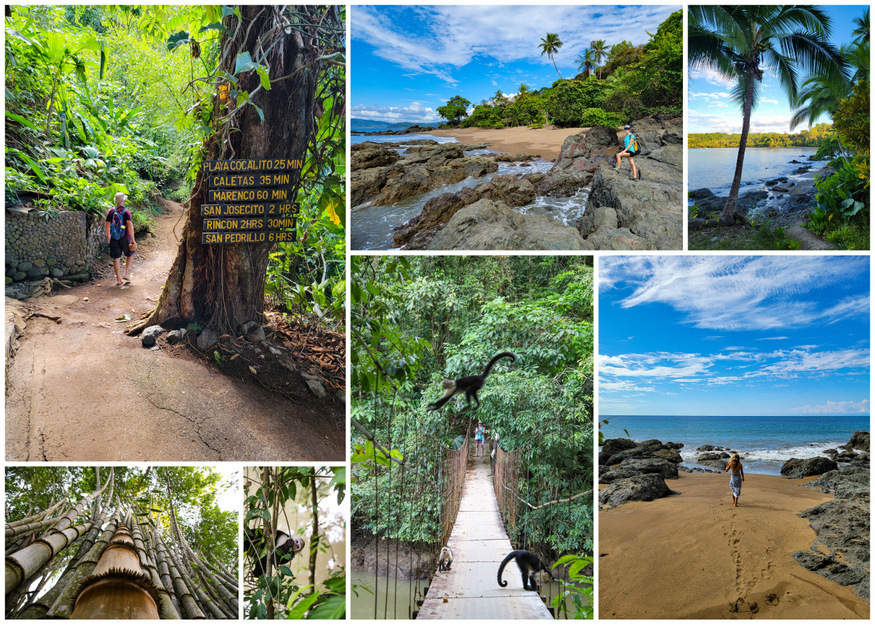 With 134 inches of annual rainfall, we weren’t surprised to wake up to a tropical downpour. We spent the morning working on my broken computer (Mike literally dismantled it into 50 pieces in hopes of saving our digital nomad lifeline)…until the sun called us out for a must-do adventure: The Drake Bay Hiking Trail. It’s 12.5 miles round-trip, but to make it a little more leisurely you can opt to take a boat back from Playa San Josecito or just hike until you find the beach that calls to you. Marveling at towering bamboo, bouncing along suspension bridges, and stopping to watch swinging Capuchin monkeys, we ambled our way to Cocolito Beach. We walked the golden sand past a few couples making sand castles and reading paperback novels, and scaled the black rocks to find a totally private cove. The formations were like rough-hewen sculptures jutting out of the sea, with tidepools in their pockets, and cliffs causing dramatic crashing waves. Add soft sand, freshly fallen coconuts, and a picnic blanket for a romantic beach day.
With 134 inches of annual rainfall, we weren’t surprised to wake up to a tropical downpour. We spent the morning working on my broken computer (Mike literally dismantled it into 50 pieces in hopes of saving our digital nomad lifeline)…until the sun called us out for a must-do adventure: The Drake Bay Hiking Trail. It’s 12.5 miles round-trip, but to make it a little more leisurely you can opt to take a boat back from Playa San Josecito or just hike until you find the beach that calls to you. Marveling at towering bamboo, bouncing along suspension bridges, and stopping to watch swinging Capuchin monkeys, we ambled our way to Cocolito Beach. We walked the golden sand past a few couples making sand castles and reading paperback novels, and scaled the black rocks to find a totally private cove. The formations were like rough-hewen sculptures jutting out of the sea, with tidepools in their pockets, and cliffs causing dramatic crashing waves. Add soft sand, freshly fallen coconuts, and a picnic blanket for a romantic beach day.
More in Drake Bay
 Caño Island: Take a boat trip to this biosphere reserve. You can spot dolphins and whales along the way and when you arrive, snorkel a reef that draws huge schools of colorful fish. The island is uninhabited and protected for its flora and fauna, in addition to its archaeological importance as a Pre-Columbian burial ground.
Caño Island: Take a boat trip to this biosphere reserve. You can spot dolphins and whales along the way and when you arrive, snorkel a reef that draws huge schools of colorful fish. The island is uninhabited and protected for its flora and fauna, in addition to its archaeological importance as a Pre-Columbian burial ground.
Night Walk: Upwards of 60% of Osa’s wildlife is nocturnal so head out for the species you’d otherwise miss. Take a tour with “Tracie the Bug Lady,” a biologist and insect enthusiast, for tons of fun facts and the chance to see vibrant tree frogs, tailless scorpions, red-eyed tree snakes, owl butterflies, praying mantis, sleeping hummingbirds, and more.
Floating Tour on Río Claro: Not your lazy river ride, this is a rainforest hike meets, waterfall swimming holes, cliff jumping, and rock hopping with a relaxing finale at Río Claro beach. Head out with the pros at Pachenco Tours.
Drake Bay Hotels: The luxurious Drake Bay Getaway has a prime location a top a hill overlooking the main beach, and is firmly committed to sustainability in accordance with the Paris Pledge for Action. Just down the hill and along the hiking trail, Aguila de Osa has long been a leader in Costa Rica’s eco-lodges and Osa’s conservation, with lovely rooms for lower rates. For something even more secluded and a 5-minute boat ride from town, Copa de Arbol’s villas are a great all-inclusive option.
Puerto Jiménez
 We woke up at 4am to catch the day’s only “collectivo” bus over the mountains to the Gulfo Dulce side and the biggest town on the peninsula, Puerto Jiménez. The main street was as normal as any Costa Rican town with hardware stores, clothing shops, and banks, but with adventure outfitters and guest houses mixed in. Nothing was open when we arrived at dawn, but the tables and chairs were out at Cafeteria Monka, so we made ourselves comfortable and watched the town wake up, starting with the scarlet macaws, flying in pairs. By quarter to eight there was a rush of bicycles and mom’s ushering their kids to school. There aren’t many educational resources in this area so the non-profit ASCONA has picked up where schools leave off, with a library and community center for families to learn, gather, and create. We walked to the building, covered in rainforest-inspired murals, and poked around their small museum of historic photographs, children’s art studio, and boutique of hand-made souvenirs. We had the privilege of meeting the ASCONA president, Ifigenia Canet, and were swept up in her passion for their community programs. She’s committed to the conservation of Osa, through educating locals on the value of protecting the rainforest–for the planet, their children, and their own livelihoods. Shopping their artisan-made souvenirs and helps support their programs. Be sure to check out the library and Ifi’s community-based tour company, Osa Wild!
We woke up at 4am to catch the day’s only “collectivo” bus over the mountains to the Gulfo Dulce side and the biggest town on the peninsula, Puerto Jiménez. The main street was as normal as any Costa Rican town with hardware stores, clothing shops, and banks, but with adventure outfitters and guest houses mixed in. Nothing was open when we arrived at dawn, but the tables and chairs were out at Cafeteria Monka, so we made ourselves comfortable and watched the town wake up, starting with the scarlet macaws, flying in pairs. By quarter to eight there was a rush of bicycles and mom’s ushering their kids to school. There aren’t many educational resources in this area so the non-profit ASCONA has picked up where schools leave off, with a library and community center for families to learn, gather, and create. We walked to the building, covered in rainforest-inspired murals, and poked around their small museum of historic photographs, children’s art studio, and boutique of hand-made souvenirs. We had the privilege of meeting the ASCONA president, Ifigenia Canet, and were swept up in her passion for their community programs. She’s committed to the conservation of Osa, through educating locals on the value of protecting the rainforest–for the planet, their children, and their own livelihoods. Shopping their artisan-made souvenirs and helps support their programs. Be sure to check out the library and Ifi’s community-based tour company, Osa Wild!
Luna Lodge
 Another Osa mover and shaker in the name of conversation and eco-tourism is Lana Wedmore, the owner of Luna Lodge. Her gorgeous hotel has a five-leaf sustainability rating, incredible wellness programs, and robust activities, though her story and mission is what inspired us to book a four-night stay. The Luna Lodge Team picked us up from Puerto Jiménez and the driver took us on a veritable safari, spotting monkeys, owls, macaws, and animals we would have never noticed through the tinted windows. The winding road hit a dead end at the village of Carate, where we hung a right up a dirt road into the river valley. Shifting into four-wheel-drive, our tires climbed rocks and splashed through streams. We passed one house with a giant sluice-box and an old man, still hanging on to Osa’s gold-mining days. The jungle-covered road seemed almost comically steep…then a signed appeared, “The worst is over, keep going.” How the heck did Lana pull off building on top of this mountain? Forty years ago she studied abroad in Costa Rica, then in 1991 she returned on a one-way trip from Colorado to the Osa Peninsula. She became a tour guide and lived for nine years in a tented camp on the beach (directly below her present lodge) until an old miner approached this free-spirit about buying his land. He wanted the land to go to someone who would preserve this sliver of the rainforest. Today Luna Lodge and the land-conservation non-profit White Hawk Foundation do exactly that.
Another Osa mover and shaker in the name of conversation and eco-tourism is Lana Wedmore, the owner of Luna Lodge. Her gorgeous hotel has a five-leaf sustainability rating, incredible wellness programs, and robust activities, though her story and mission is what inspired us to book a four-night stay. The Luna Lodge Team picked us up from Puerto Jiménez and the driver took us on a veritable safari, spotting monkeys, owls, macaws, and animals we would have never noticed through the tinted windows. The winding road hit a dead end at the village of Carate, where we hung a right up a dirt road into the river valley. Shifting into four-wheel-drive, our tires climbed rocks and splashed through streams. We passed one house with a giant sluice-box and an old man, still hanging on to Osa’s gold-mining days. The jungle-covered road seemed almost comically steep…then a signed appeared, “The worst is over, keep going.” How the heck did Lana pull off building on top of this mountain? Forty years ago she studied abroad in Costa Rica, then in 1991 she returned on a one-way trip from Colorado to the Osa Peninsula. She became a tour guide and lived for nine years in a tented camp on the beach (directly below her present lodge) until an old miner approached this free-spirit about buying his land. He wanted the land to go to someone who would preserve this sliver of the rainforest. Today Luna Lodge and the land-conservation non-profit White Hawk Foundation do exactly that.
Luna Bungalows
 We pulled up to the lodge on the upper slopes of the Carate River Valley. A grand open-air rancho building anchors the property and tropical flowers line paths leading to the pool, eight bungalows, three haciendas, seven platform tents, yoga pavillion, and spa. We were shown to our bamboo bungalow with huge screened-in windows and couldn’t decide where to land first, our four-poster bed, the open-air shower, or the porch’s rocking chairs. The tree-covered peaks and symphony of bird songs called us to the terrace and soon after, the hiking trails.
We pulled up to the lodge on the upper slopes of the Carate River Valley. A grand open-air rancho building anchors the property and tropical flowers line paths leading to the pool, eight bungalows, three haciendas, seven platform tents, yoga pavillion, and spa. We were shown to our bamboo bungalow with huge screened-in windows and couldn’t decide where to land first, our four-poster bed, the open-air shower, or the porch’s rocking chairs. The tree-covered peaks and symphony of bird songs called us to the terrace and soon after, the hiking trails.
The Grounds
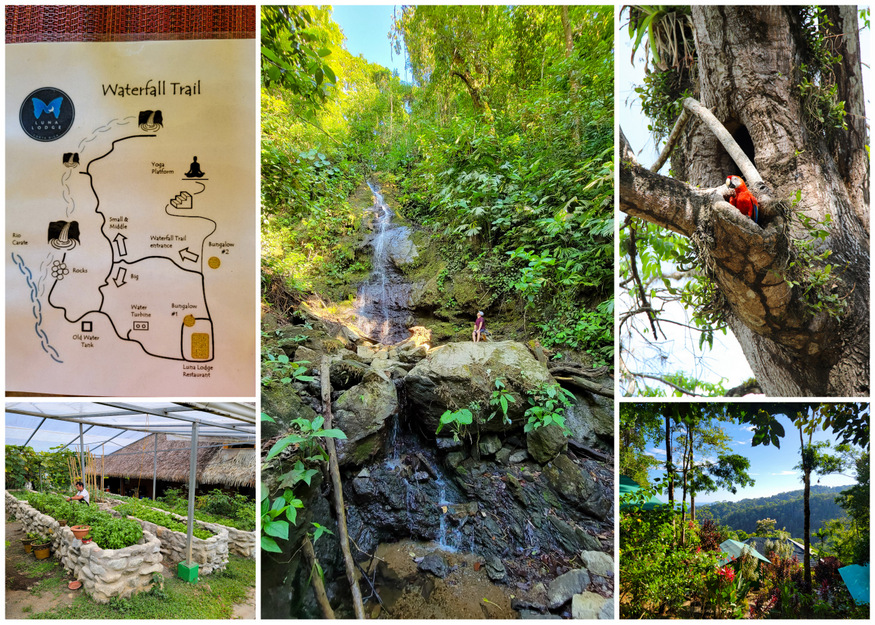 To better understand and explore Luna Lodge’s 60 acres of rainforest, plus the hundreds of fruit trees and endemic plants they started from seed, we explored their network of trails with educational signs. We took the “Loop of Gold” from the primary rainforest into the secondary, reading the occasional botanical ID on a tree or an inspirational quote, like “Look deep into nature, and you’ll understand everything better” or in Spanish, “Green is the new gold.” We passed the water turbines, the solar array, and the permaculture garden…and saw how the lodge provides 100% of its own power and as much of their food as possible. We then connected to the waterfall trail, a series of three cascades and swimming holes right on property.
To better understand and explore Luna Lodge’s 60 acres of rainforest, plus the hundreds of fruit trees and endemic plants they started from seed, we explored their network of trails with educational signs. We took the “Loop of Gold” from the primary rainforest into the secondary, reading the occasional botanical ID on a tree or an inspirational quote, like “Look deep into nature, and you’ll understand everything better” or in Spanish, “Green is the new gold.” We passed the water turbines, the solar array, and the permaculture garden…and saw how the lodge provides 100% of its own power and as much of their food as possible. We then connected to the waterfall trail, a series of three cascades and swimming holes right on property.
Dining
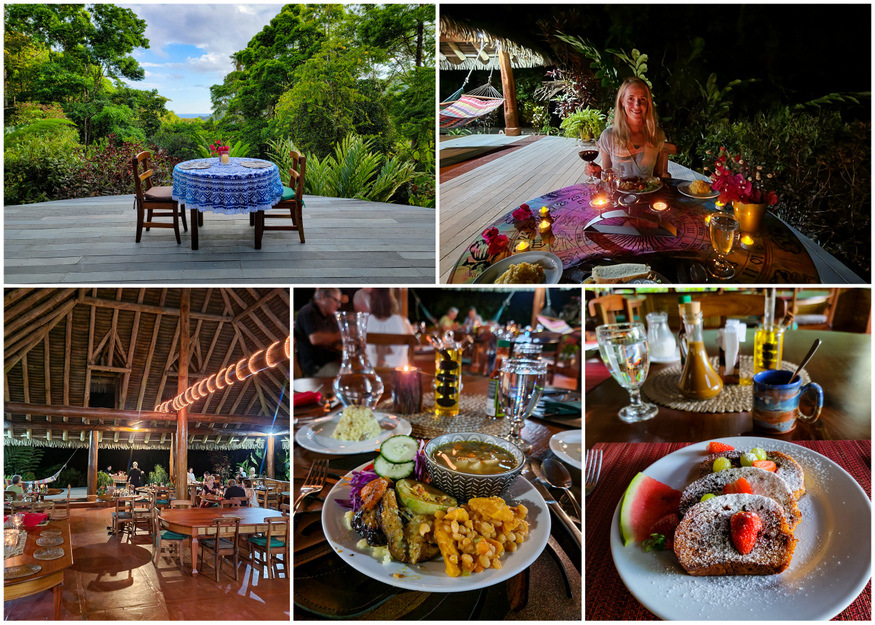 Each evening we went down for pre-dinner appetizers, followed by a beautiful family-style spread. As a vegetarian and wellness guru, Lana has made sure to use organic ingredients and cater to all dietary needs. Of the 5-7 dishes available each evening, all but one will be vegetarian, if not vegan…so we were in heaven! When it came time for our anniversary dinner later that week, they surprised us with a table on the balcony lit with a pathway of candles, and a personalized vegan cake for dessert.
Each evening we went down for pre-dinner appetizers, followed by a beautiful family-style spread. As a vegetarian and wellness guru, Lana has made sure to use organic ingredients and cater to all dietary needs. Of the 5-7 dishes available each evening, all but one will be vegetarian, if not vegan…so we were in heaven! When it came time for our anniversary dinner later that week, they surprised us with a table on the balcony lit with a pathway of candles, and a personalized vegan cake for dessert.
Corcovado National Park
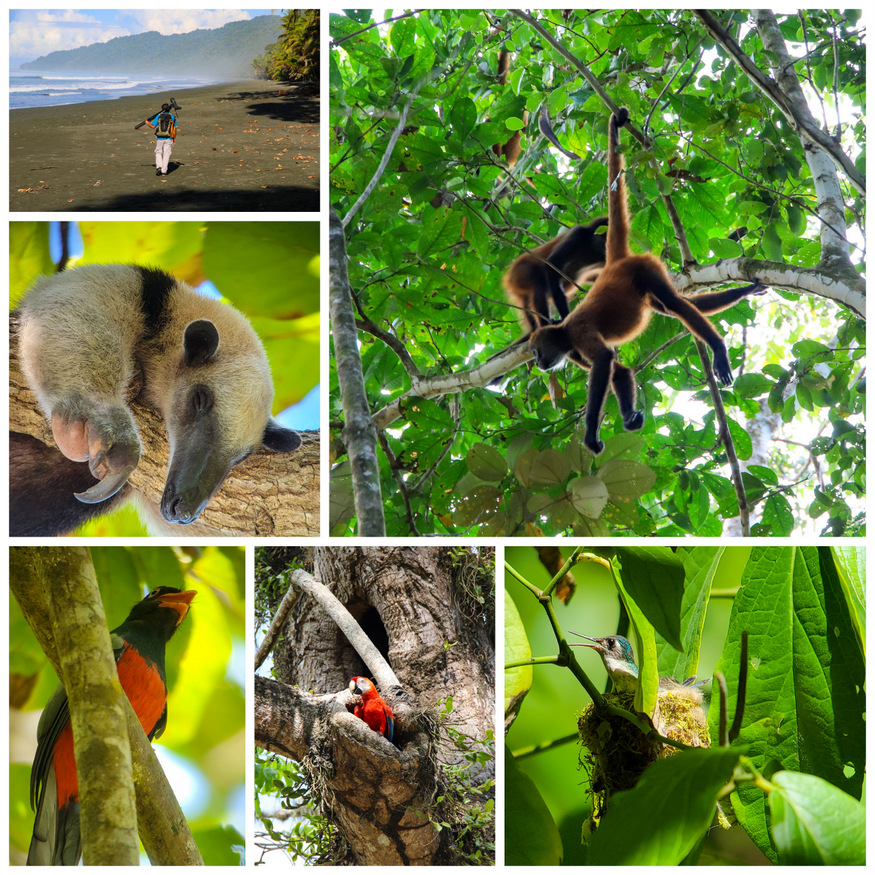 The sun was barely up and breakfast and lunch-boxes were ready for anyone heading out on one of Luna Lodge’s many excursions. We were venturing into the crown jewel of Osa’s wilderness areas…Corcovado National Park. Corcovado is truly an inspiring story of conservation. Logging and gold mining boomed in this area until the 1970s when the government decided to prioritize the environment over industry and made it a national park. Today it’s a happy home to 500 tree species, the highly endangered giant anteater, harpy eagles, all of Costa Rica’s big cats, their four native species of monkeys, plus Baird’s Tapir, Central America’s largest land mammal. Basically a wildlife enthusiast’s nirvana. Everyone needs a guide to explore the park, which can be done as multi-day treks between ranger stations, a boat trip from Drake Bay, or in the case of Luna Lodge guests, hiking in right from Carate beach. Our wildlife sightings began right off the bat, especially with our guide Marlon’s Spidey senses. Before working for Luna Lodge, he walked this trail five hours a day, everyday for four years, so he knew where to look for hummingbird nests, how to make toucan mating calls, and which endemic plants had medicinal uses. The trail weaved in and out of the thick rainforest, opening up to pristine beaches with bluffs in the distance and under the cover of the canopy. After spotting the colorful slaty-tailed tragon, a great curassow, yellow-throated toucan, the small-but-mighty golden orb weaver, and more monkeys and coatis than we could count, we saw our very first anteater! This northern tamandua was napping in a tree so we relaxed alongside him with a picnic lunch and watched this cutie stir in the branches. What a treat! See more of our wildlife photos.
The sun was barely up and breakfast and lunch-boxes were ready for anyone heading out on one of Luna Lodge’s many excursions. We were venturing into the crown jewel of Osa’s wilderness areas…Corcovado National Park. Corcovado is truly an inspiring story of conservation. Logging and gold mining boomed in this area until the 1970s when the government decided to prioritize the environment over industry and made it a national park. Today it’s a happy home to 500 tree species, the highly endangered giant anteater, harpy eagles, all of Costa Rica’s big cats, their four native species of monkeys, plus Baird’s Tapir, Central America’s largest land mammal. Basically a wildlife enthusiast’s nirvana. Everyone needs a guide to explore the park, which can be done as multi-day treks between ranger stations, a boat trip from Drake Bay, or in the case of Luna Lodge guests, hiking in right from Carate beach. Our wildlife sightings began right off the bat, especially with our guide Marlon’s Spidey senses. Before working for Luna Lodge, he walked this trail five hours a day, everyday for four years, so he knew where to look for hummingbird nests, how to make toucan mating calls, and which endemic plants had medicinal uses. The trail weaved in and out of the thick rainforest, opening up to pristine beaches with bluffs in the distance and under the cover of the canopy. After spotting the colorful slaty-tailed tragon, a great curassow, yellow-throated toucan, the small-but-mighty golden orb weaver, and more monkeys and coatis than we could count, we saw our very first anteater! This northern tamandua was napping in a tree so we relaxed alongside him with a picnic lunch and watched this cutie stir in the branches. What a treat! See more of our wildlife photos.
Kayaking Laguna Pejeperro
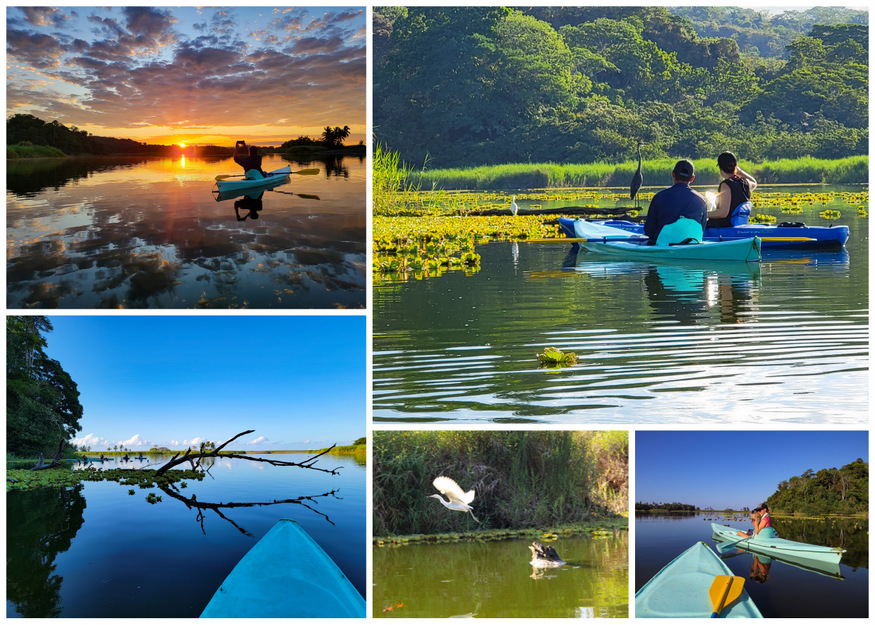 That afternoon we took it easy by the pool and went to bed early to prep for another big day ahead. Well before sunrise, we set off with Marlon and a small group to kayak Laguna Pejeperro (aka Fish Dog Lagoon). Walking bleary-eyed along the moonlit trail and wading into dark water, we momentarily questioned what we were doing here, then came the most goooooorgeous sunrise with glowing clouds and shorebirds reflecting back at us. We paddled the edges of the lagoon and learned about unusual species like the “Juevo Frito,” a bird who makes a sound like a sizzling fried egg, and the “Jesus Christo Lizard” that walks on water. Ibis, egrets, kingfishers, northern jacana, and more wildlife reminded us that it’s always worth getting up for sunrise in the Osa Peninsula.
That afternoon we took it easy by the pool and went to bed early to prep for another big day ahead. Well before sunrise, we set off with Marlon and a small group to kayak Laguna Pejeperro (aka Fish Dog Lagoon). Walking bleary-eyed along the moonlit trail and wading into dark water, we momentarily questioned what we were doing here, then came the most goooooorgeous sunrise with glowing clouds and shorebirds reflecting back at us. We paddled the edges of the lagoon and learned about unusual species like the “Juevo Frito,” a bird who makes a sound like a sizzling fried egg, and the “Jesus Christo Lizard” that walks on water. Ibis, egrets, kingfishers, northern jacana, and more wildlife reminded us that it’s always worth getting up for sunrise in the Osa Peninsula.
Preserving Osa
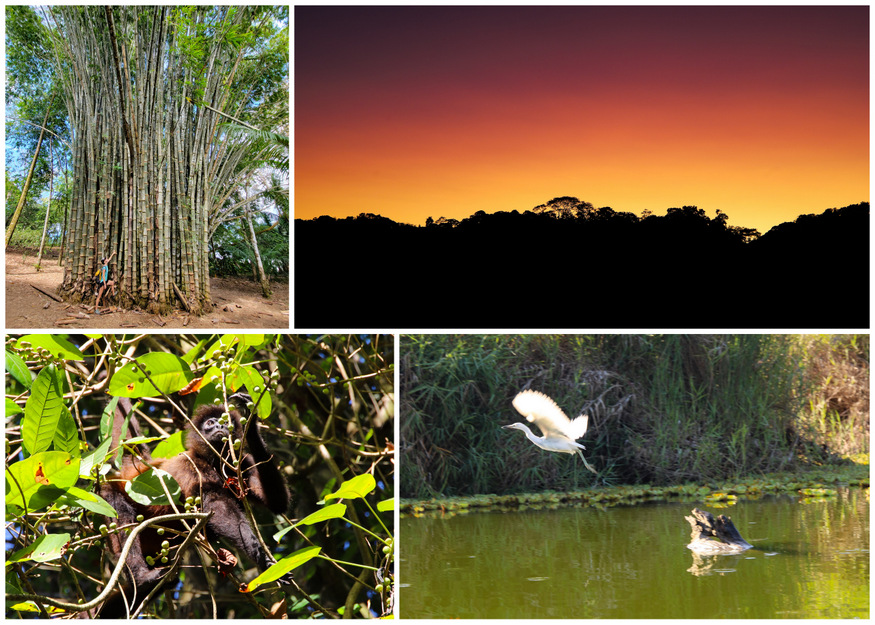 On our final morning, we did a yoga class with Lana, overlooking the ocean, surrounded by trees, listening to the macaws, and felt so such gratitude for this experience. After our namastes, she invited us to her house and studio where she does massage, reiki, and sound healing. We walked into her living room to find it completely open on one side and looking right up the Carate River Valley. Waking up with this view is her reminder to honor and protect this precious place. Since 2010, she has been running the White Hawk Foundation, a land trust to preserve the rainforest and wildlife corridors from the Carate River Valley to the national park. To further support the ecosystem, Luna Lodge is an active member of The Turtle Protection Committee, ASCONA, and The Association of Integral Development of Corcovado. The Osa is a fragile place, but supporting the businesses and nonprofits with conservation at the core of their mission will help preserve it for future generations of visitors and species alike. We were moved to donate $100 to both ASCONA’s community library and OsaConservation.org.
On our final morning, we did a yoga class with Lana, overlooking the ocean, surrounded by trees, listening to the macaws, and felt so such gratitude for this experience. After our namastes, she invited us to her house and studio where she does massage, reiki, and sound healing. We walked into her living room to find it completely open on one side and looking right up the Carate River Valley. Waking up with this view is her reminder to honor and protect this precious place. Since 2010, she has been running the White Hawk Foundation, a land trust to preserve the rainforest and wildlife corridors from the Carate River Valley to the national park. To further support the ecosystem, Luna Lodge is an active member of The Turtle Protection Committee, ASCONA, and The Association of Integral Development of Corcovado. The Osa is a fragile place, but supporting the businesses and nonprofits with conservation at the core of their mission will help preserve it for future generations of visitors and species alike. We were moved to donate $100 to both ASCONA’s community library and OsaConservation.org.
Osa Peninsula: Get ready for your trip!
 Getting There: To get to Puerto Jimenez, take the 1-hour SANSA flight from San Jose airport to Puerto Jimenez or hop the Grupo Blanco bus from most any Puntarenas coastal town. To get to Drake Bay, taking the river boat from Sierpe is the most fun and efficient. There is a road that connects the two towns but has infrequent, pre-dawn departures and is impassable in the rainy season.
Getting There: To get to Puerto Jimenez, take the 1-hour SANSA flight from San Jose airport to Puerto Jimenez or hop the Grupo Blanco bus from most any Puntarenas coastal town. To get to Drake Bay, taking the river boat from Sierpe is the most fun and efficient. There is a road that connects the two towns but has infrequent, pre-dawn departures and is impassable in the rainy season.
When to Go: January-April is reliably sunny with little to no rainfall. May-August afternoon showers are common, but everything will be lush green and lodges’ drop their rates significantly. Avoid September-October when rain is the heaviest and the most lodging closes for the season.
Travel Insurance: We highly recommend getting travel insurance before heading into this remote and wild part of Costa Rica. Allianz Travel Insurance has comprehensive and affordable plans for single trips, or our personal favorite is their All Trips Premier Plan which covers a full year of travels for your entire family.
More Activities
 Overnight in Corcovado Park. Truly immerse yourself in Corcovado’s wilderness with an overnight at the Sirena Ranger station. It’s a strenuous hike and met with very basic accommodations, but sure to be unforgettable. See Osa Wild’s tours into the park.
Overnight in Corcovado Park. Truly immerse yourself in Corcovado’s wilderness with an overnight at the Sirena Ranger station. It’s a strenuous hike and met with very basic accommodations, but sure to be unforgettable. See Osa Wild’s tours into the park.
Get Local at Dos Brazos de Rio Tigre: The community association of ACODOBRARTI helps connect travelers with locals in this authentic village with history tours, horseback riding, hikes, and a variety of cultural experiences.
Whale Watch in Golfo Dulce: One of just four tropical fjords on the planet, and the only place on earth where populations of both Northern and Southern Humpback whales meet to birth their young, Golfo Dulce is prime for big sightings. Head out with Golfo Dulce Retreat.
Watch our Osa Video
Have questions about the Osa Peninsula and our sustainable honeymoon trip? Lay ‘em on us in the comments.
A huge thank you to our sponsor Allianz Travel Insurance for believing in the importance of sustainable travel and supporting eco-minded content creators like us!
